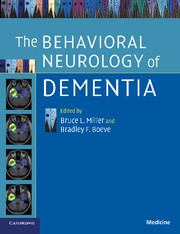Book contents
- Frontmatter
- Contents
- List of contributors
- Section 1 Introduction
- Section 2 Cognitive impairment, not demented
- 12 Cerebrovascular contributions to amnestic mild cognitive impairment
- 13 Mild cognitive impairment
- 14 Mild cognitive impairment subgroups
- 15 Early clinical features of the parkinsonian-related dementias
- 16 Dementia treatment
- 17 Dementia and cognition in the oldest-old
- Section 3 Slowly progressive dementias
- Section 4 Rapidly progressive dementias
- Index
- References
13 - Mild cognitive impairment
Published online by Cambridge University Press: 31 July 2009
- Frontmatter
- Contents
- List of contributors
- Section 1 Introduction
- Section 2 Cognitive impairment, not demented
- 12 Cerebrovascular contributions to amnestic mild cognitive impairment
- 13 Mild cognitive impairment
- 14 Mild cognitive impairment subgroups
- 15 Early clinical features of the parkinsonian-related dementias
- 16 Dementia treatment
- 17 Dementia and cognition in the oldest-old
- Section 3 Slowly progressive dementias
- Section 4 Rapidly progressive dementias
- Index
- References
Summary
Introduction
Most degenerative conditions are characterized by insidious onset and gradually progressive decline. Therefore, the presumption of an early stage in the development of a degenerative disorder in which a person might be “partially symptomatic” is quite plausible. Applied to Alzheimer's disease (AD), the prodromal phase might represent an individual who is slightly forgetful with preservation of other cognitive and functional abilities. Mild cognitive impairment (MCI) refers to the transitional state between normal cognitive changes of aging and the earliest clinical features of dementia. As such, it has become an important topic in clinical practice and research. As initially conceived, MCI referred to memory impairment with preserved non-memory cognitive performance and functional abilities, but more recently, the term has been expanded to include other cognitive domains besides memory. Most literature refers to the amnestic (memory predominant) form of MCI (aMCI), a likely precursor of Alzheimer's disease (AD).
In recent years, a tremendous amount of information has been published regarding the early diagnosis of dementia. Consequently, a more general construct of MCI and of specific subtypes of MCI has been adopted as the prodromal phases of various diseases. The general framework of MCI as the incipient phase of a degenerative disease remains an important concept. Research since the mid 1990s on MCI has shown the criteria to be reliable, and the outcomes of patients are known. Some predictors of progression from MCI to AD are known and others are still being evaluated.
- Type
- Chapter
- Information
- The Behavioral Neurology of Dementia , pp. 172 - 187Publisher: Cambridge University PressPrint publication year: 2009
References
- 1
- Cited by



